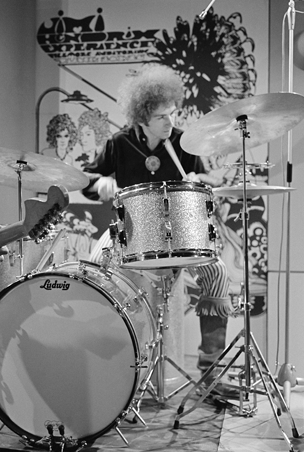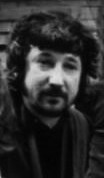
The Animals are an English rock band formed in Newcastle upon Tyne in 1963. The Animals' original lineup consisted of deep-voiced frontman Eric Burdon, guitarist Hilton Valentine, bass guitarist Chas Chandler, keyboardist Alan Price, and drummer John Steel. Known for their gritty, bluesy sound, they balanced tough, rock-edged pop singles against rhythm-and-blues-orientated album material, and were part of the British Invasion of the US.

Cornelius "Sonny" Fortune was an American jazz saxophonist. He played soprano, alto, tenor, and baritone saxophones, clarinet, and flute.

John Graham "Mitch" Mitchell was an English drummer and child actor, who was best known for his work in the Jimi Hendrix Experience for which he was inducted into the Rock and Roll Hall of Fame in 1992. He was inducted into the Modern Drummer Hall of Fame in 2009. In 2016, Mitchell was ranked number 8 in Rolling Stone magazine's list of the "100 Greatest Drummers of All Time".

Alan Price is an English musician who first found prominence as the original keyboardist of the English rock band the Animals. He left the band in 1965 to form the Alan Price Set; his hit singles with and without the group include "Simon Smith and the Amazing Dancing Bear", "The House That Jack Built", "Rosetta" and "Jarrow Song". Price is also known for work in film and television, taking occasional acting roles and composing the soundtrack of Lindsay Anderson's film O Lucky Man! (1973). He was inducted into the Rock and Roll Hall of Fame in 1994 as a member of the Animals.

David Thomas Mason is an English singer-songwriter and guitarist from Worcester, who first found fame with the rock band Traffic, and went on to play and record with many notable pop and rock musicians, including Paul McCartney, George Harrison, the Rolling Stones, Jimi Hendrix, Eric Clapton, Michael Jackson, David Crosby, Graham Nash, Steve Winwood, Fleetwood Mac, Delaney & Bonnie, Leon Russell, and Cass Elliot.

Howard Lewis Johnson was an American jazz musician, known mainly for his work on tuba and baritone saxophone, although he also played the bass clarinet, trumpet, and other reed instruments. He is known to have expanded the tuba’s known capacities in jazz.

Georgie Fame is an English R&B and jazz musician. Fame, who had a string of 1960s hits, is still performing, often working with contemporaries such as Alan Price, Van Morrison and Bill Wyman. Fame is the only British music act to have achieved three UK No. 1 hits with his only top 10 chart entries: "Yeh, Yeh" in 1964, "Get Away" in 1966 and "The Ballad of Bonnie and Clyde" in 1968.

Herman "Junior" Parker was an American blues singer and harmonica player. He is best remembered for his voice which has been described as "honeyed" and "velvet-smooth". One music journalist noted, "For years, Junior Parker deserted down home harmonica blues for uptown blues-soul music". In 2001, he was inducted into the Blues Hall of Fame. Parker is also inducted into the Mississippi Musicians Hall of Fame.

Philip John Albert "Jon" Hiseman was an English drummer, recording engineer, record producer, and music publisher. He played with the Graham Bond Organisation, with John Mayall & the Bluesbreakers and later formed what has been described as the "seminal" jazz rock/progressive rock band, Colosseum. He later formed Colosseum II in 1975.

Richard Edwin Morrissey was a British jazz musician and composer. He played the tenor saxophone, soprano saxophone and flute.
Blue Beat Records is an English record label that released Jamaican rhythm and blues (R&B) and ska music in the 1960s and later decades. Its reputation led to the use of the word bluebeat as a generic term to describe all styles of early Jamaican pop music, including music by artists not associated with the record label.
Michael Waller was an English drummer, who played with many of the biggest names on the UK rock and blues scene, after he became a professional musician in 1960. In addition to being a member, albeit sometimes briefly, of some of the seminal bands of the 1960s, Waller played as a session musician with a host of UK and US artists.
"Last Night" is an instrumental recorded by The Mar-Keys. Released in 1961, the track appeared on Last Night!, the first LP released by the Stax label.
John Burch was an English pianist, composer and bandleader, equally at home playing traditional jazz, bebop, blues, skiffle, boogie-woogie and rock.

Sound Venture is a jazz album recorded by Georgie Fame and the Harry South Big Band in 1966. Featuring many of Britain's top jazz musicians, and arranged by big band arranger Harry South, it marked a departure from Fame's R&B hits with the Blue Flames. The record peaked at number 9 on the national albums chart in the UK.

Georgie Fame and the Blue Flames were a British rhythm and blues group during the 1960s whose repertoire spanned R&B, pop, rock and jazz.
The Alan Bown Set, later known as The Alan Bown! or just Alan Bown, were a British band of the 1960s and 1970s whose music evolved from jazz and blues through soul and rhythm and blues and ended up as psychedelia and progressive rock. The band achieved limited chart success and is best known for the role it played in developing the careers of numerous musicians including Mel Collins, John Helliwell, Robert Palmer, Jess Roden and Dougie Thomson.

Klooks Kleek was a jazz and rhythm 'n’ blues club on the first floor of the Railway Hotel, West Hampstead, north-west London. Named after "Klook's Clique", a 1956 album by jazz drummer Kenny Clarke, the club opened on 11 January 1961 with special guest Don Rendell and closed nine years later on 28 January 1970 after a session by drummer Keef Hartley’s group.

The Yardbirds are an English rock band, formed in London in 1963. The band started the careers of three of rock's most famous guitarists: Eric Clapton (1963–1965), Jeff Beck (1965–1966) and Jimmy Page (1966–1968), all of whom ranked in the top five of Rolling Stone magazine's list of 100 greatest guitarists. The band's other members during 1963–1968 were vocalist/harmonica player Keith Relf, drummer Jim McCarty, rhythm guitarist Chris Dreja, and bassist Paul Samwell-Smith, with Dreja switching to bass when Samwell-Smith departed in 1966. The band had a string of hits throughout the mid-1960s, including "For Your Love", "Heart Full of Soul", "Shapes of Things", and "Over Under Sideways Down".

Rhythm and Blues at the Flamingo is a live rhythm and blues album recorded by Georgie Fame and the Blue Flames at the Flamingo Club in September 1963 and released by Columbia Records in 1964. It was the first album on which Fame appeared.
















